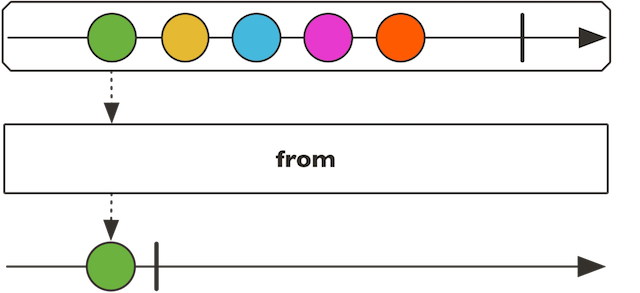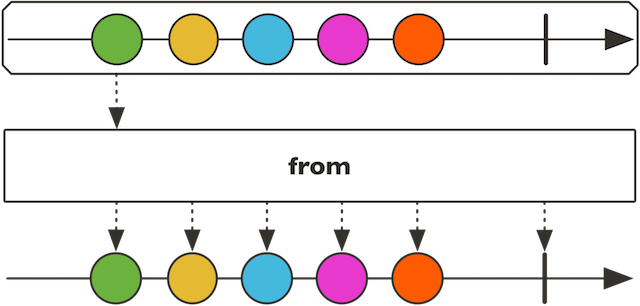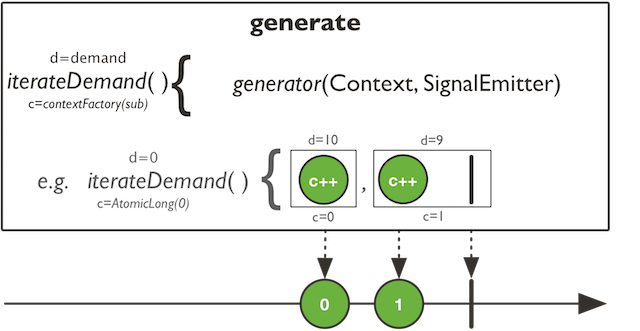序
本文主要讲一下reactive streams的Publisher接口的两个抽象类Mono与Flux
Publisher
reactive-streams-1.0.1-sources.jar!/org/reactivestreams/Publisher.java
/**
* A {@link Publisher} is a provider of a potentially unbounded number of sequenced elements, publishing them according to
* the demand received from its {@link Subscriber}(s).
*
* A {@link Publisher} can serve multiple {@link Subscriber}s subscribed {@link #subscribe(Subscriber)} dynamically
* at various points in time.
*
* @param the type of element signaled.
*/
public interface Publisher {
/**
* Request {@link Publisher} to start streaming data.
*
* This is a "factory method" and can be called multiple times, each time starting a new {@link Subscription}.
*
* Each {@link Subscription} will work for only a single {@link Subscriber}.
*
* A {@link Subscriber} should only subscribe once to a single {@link Publisher}.
*
* If the {@link Publisher} rejects the subscription attempt or otherwise fails it will
* signal the error via {@link Subscriber#onError}.
*
* @param s the {@link Subscriber} that will consume signals from this {@link Publisher}
*/
public void subscribe(Subscriber s);
}
Mono
reactor-core-3.1.2.RELEASE-sources.jar!/reactor/core/publisher/Mono.java
public abstract class Mono implements Publisher {
//...
/**
* Expose the specified {@link Publisher} with the {@link Mono} API, and ensure it will emit 0 or 1 item.
* The source emitter will be cancelled on the first `onNext`.
*
*  *
*
* @param source the {@link Publisher} source
* @param the source type
*
* @return the next item emitted as a {@link Mono}
*/
public static Mono from(Publisher source) {
if (source instanceof Mono) {
@SuppressWarnings("unchecked")
Mono casted = (Mono) source;
return casted;
}
if (source instanceof Flux) {
@SuppressWarnings("unchecked")
Flux casted = (Flux) source;
return casted.next();
}
return onAssembly(new MonoFromPublisher<>(source));
}
/**
* Create a new {@link Mono} that emits the specified item, which is captured at
* instantiation time.
*
*
*  *
*
* @param data the only item to onNext
* @param the type of the produced item
*
* @return a {@link Mono}.
*/
public static Mono just(T data) {
return onAssembly(new MonoJust<>(data));
}
//...
}
Flux
reactor-core-3.1.2.RELEASE-sources.jar!/reactor/core/publisher/Flux.java
public abstract class Flux implements Publisher {
//......
/**
* Programmatically create a {@link Flux} with the capability of emitting multiple
* elements in a synchronous or asynchronous manner through the {@link FluxSink} API.
*
* This Flux factory is useful if one wants to adapt some other multi-valued async API
* and not worry about cancellation and backpressure (which is handled by buffering
* all signals if the downstream can't keep up).
*
* For example:
*
*
* Flux.<String>create(emitter -> {
*
* ActionListener al = e -> {
* emitter.next(textField.getText());
* };
* // without cleanup support:
*
* button.addActionListener(al);
*
* // with cleanup support:
*
* button.addActionListener(al);
* emitter.onDispose(() -> {
* button.removeListener(al);
* });
* }, FluxSink.OverflowStrategy.LATEST);
*
*
* @param The type of values in the sequence
* @param backpressure the backpressure mode, see {@link OverflowStrategy} for the
* available backpressure modes
* @param emitter Consume the {@link FluxSink} provided per-subscriber by Reactor to generate signals.
* @return a {@link Flux}
*/
public static Flux create(Consumer> emitter, OverflowStrategy backpressure) {
return onAssembly(new FluxCreate<>(emitter, backpressure, FluxCreate.CreateMode.PUSH_PULL));
}
/**
* Decorate the specified {@link Publisher} with the {@link Flux} API.
*
*  *
*
* @param source the source to decorate
* @param The type of values in both source and output sequences
*
* @return a new {@link Flux}
*/
public static Flux from(Publisher source) {
if (source instanceof Flux) {
@SuppressWarnings("unchecked")
Flux casted = (Flux) source;
return casted;
}
if (source instanceof Fuseable.ScalarCallable) {
try {
@SuppressWarnings("unchecked") T t =
((Fuseable.ScalarCallable) source).call();
if (t != null) {
return just(t);
}
return empty();
}
catch (Exception e) {
return error(e);
}
}
return wrap(source);
}
/**
* Programmatically create a {@link Flux} by generating signals one-by-one via a
* consumer callback and some state, with a final cleanup callback. The
* {@code stateSupplier} may return {@literal null} but your cleanup {@code stateConsumer}
* will need to handle the null case.
*
*  *
*
*
* @param the value type emitted
* @param the per-subscriber custom state type
* @param stateSupplier called for each incoming Subscriber to provide the initial state for the generator bifunction
* @param generator Consume the {@link SynchronousSink} provided per-subscriber by Reactor
* as well as the current state to generate a single signal on each pass
* and return a (new) state.
* @param stateConsumer called after the generator has terminated or the downstream cancelled, receiving the last
* state to be handled (i.e., release resources or do other cleanup).
*
* @return a {@link Flux}
*/
public static Flux generate(Callable stateSupplier, BiFunction, S> generator, Consumer stateConsumer) {
return onAssembly(new FluxGenerate<>(stateSupplier, generator, stateConsumer));
}
}
实例
Mono
@Test
public void testMonoBasic(){
Mono.fromSupplier(() -> "Hello").subscribe(System.out::println);
Mono.justOrEmpty(Optional.of("Hello")).subscribe(System.out::println);
Mono.create(sink -> sink.success("Hello")).subscribe(System.out::println);
}
Mono ,是指最多只能触发(emit) (事件)一次。它对应于 RxJava 库的 Single 和 Maybe 类型或者是java的Optional。因此一个异步任务,如果只是想要在完成时给出完成信号,就可以使用 Mono
。
调用 Flux
的single()将返回一个 Mono ,而连接两个 monos一起使用 concatWith 将产生一个 Flux。
Flux
@Test
public void testBasic(){
Flux.just("Hello", "World").subscribe(System.out::println);
Flux.fromArray(new Integer[] {1, 2, 3}).subscribe(System.out::println);
Flux.empty().subscribe(System.out::println);
Flux.range(1, 10).subscribe(System.out::println);
Flux.interval(Duration.of(10, ChronoUnit.SECONDS)).subscribe(System.out::println);
}
Flux 相当于一个 RxJava Observable,能够发出 0~N 个数据项,然后(可选地)completing 或 erroring。处理多个数据项作为stream。
小结
Mono和Flux都是实现Publisher接口的抽象类,一个相当于Optional,一个相当于有0..N的stream。两个都是spring 5 reactive编程的重要基础概念。
doc
- mono
- flux